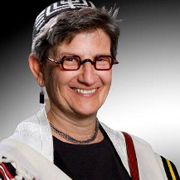On Equal Footing
 BCC’s very own Rabbi Lisa Edwards is featured on this week’s Torah Portion column in the Jewish Journal. Along with her great Torah insights about this week’s Parashat Mishpatim, she talks about our beloved 92 year old BCC member Harriet Perl. And so she writes:
BCC’s very own Rabbi Lisa Edwards is featured on this week’s Torah Portion column in the Jewish Journal. Along with her great Torah insights about this week’s Parashat Mishpatim, she talks about our beloved 92 year old BCC member Harriet Perl. And so she writes:
I watched President Barack Obama’s second inauguration from the hospital room of my 92-year-old friend Harriet. She was having an EKG during it, even though we all agreed the numbers would not provide an accurate assessment of her condition — her medical condition, that is.
“You have no idea,” she said to us, “what it means to me … that I lived long enough. I never imagined I would hear what I’m hearing today — the president of the United States including me in an inaugural address. The president of the United States saying the words ‘our gay brothers and sisters’ in his inaugural address. What I lived through — the hiding, the fear, the exclusion, afraid for my job … my livelihood. Unless you are my age, you can have no idea what it was like or what this means.”
Harriet’s “test” revealed a heart condition, all right: “I love that man,” she said over and over as the president spoke.
I thought back to Obama’s interview in May 2012, when he said that his thinking was “evolving,” and he publicly supported the right of same-sex couples to legally marry. I thought back to his signing the end of the U.S. military’s “Don’t Ask, Don’t Tell” policy (begun during the Clinton administration), and the Obama administration’s decision not to defend DOMA (the “Defense of Marriage Act”) signed into law by President Clinton. Those are huge changes in far fewer than Harriet’s 92 years, and yet I understood what she was saying to me. I could have no idea how it felt to her. And yet, I kind of do.
Last month, January 2013, saw not only President Obama’s inauguration, but also the 150th anniversary of President Abraham Lincoln signing the Emancipation Proclamation, declaring slaves in Confederate areas not under Union control to be “forever free.”
A couple of years later (1865) saw the passage of the 13th Amendment to the U.S. Constitution, ending slavery (and the Civil War) with the political and moral battle compellingly told by Steven Spielberg and Tony Kushner in their current film, “Lincoln.”
The anniversary and the Spielberg film shine a brighter light on Obama’s re-election, and a different light on this year’s reading of Parashat Mishpatim (“Rules”), which begins with God’s matter-of-fact instruction on the treatment of Hebrew slaves: “When you acquire a Hebrew slave …” (Exodus 21:2). Even though some slavery advocates in the early history of the United States used the Bible, and these verses in particular, to suggest that even God found slavery perfectly permissible, there are many verses also in Mishpatim that helped others to oppose slavery in any form. Perhaps the most compelling of these rules is one told twice in this Torah portion and 34 more times elsewhere in Torah, making it by far the most repeated value, rule or law in Torah: “You shall not oppress a stranger, for you know the soul of the stranger (v’atem ya-datem et-nefesh ha-ger), having yourselves been strangers in the land of Egypt [in Mishpatim]” (Exodus 23:9, also 22:20).
Read the full online version on the Jewish Journal’s website. A version of this article also appears in print, which is out today.




